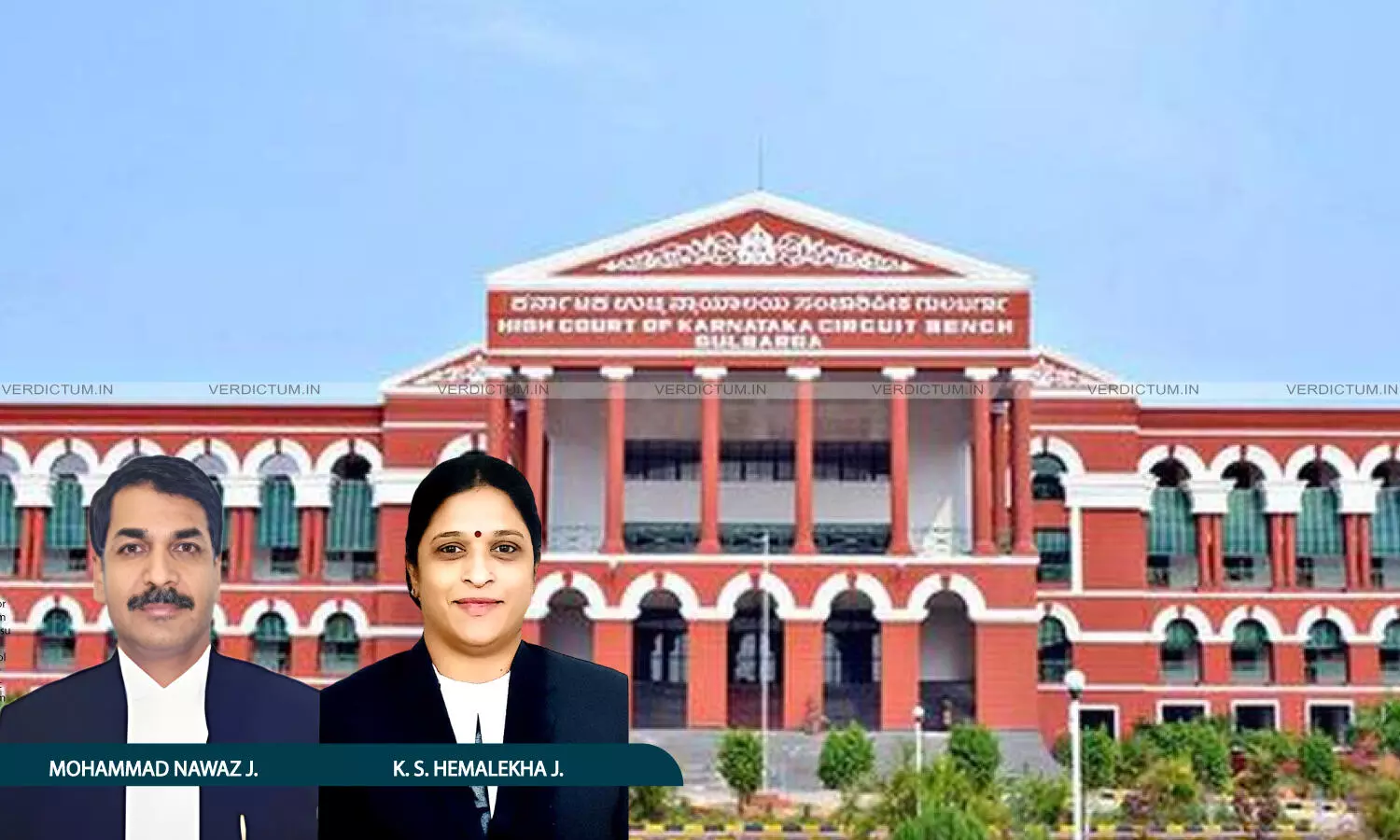
Justice Mohammad Nawaz, Justice K.S. Hemalekha, Karnataka High Court, Kalaburagi Bench
Applications For Compassionate Appointment Must Be Decided Within 90 Days: Karnataka High Court Issues Directions For Transparent Process
 |
|The Karnataka High Court dismissed a Writ Petition preferred by the State before the Kalaburagi Bench, seeking to quash the Order of the Karnataka Administrative Tribunal (KAT).
To bring clarity, transparency, and procedural fairness into the compassionate appointment process, the Karnataka High Court has issued certain directions.
A Writ Petition was preferred by the State before the Kalaburagi Bench, seeking to quash the Order of the Karnataka Administrative Tribunal (KAT).
A Division Bench comprising Justice Mohammad Nawaz and Justice K.S. Hemalekha issued the following directions –
i) Every application for compassionate appointment whether in prescribed format or not must be acknowledged in writing by the authority within 30 days along with clear communication about: a) status of the application (incomplete or complete); b) any defects in format/documentation; c) the rights of other dependants to apply; d) The applicable limitation period.
ii) In cases where the applicant is widow, illiterate or otherwise, concerned Departments must take pro-active steps to assist them in filing the application in proper format and guide them regarding the steps to be followed by the other dependants to apply.
iii) All the applications must be decided within a maximum period of 90 days from the date of receipt of the application. If the application is found not maintainable, a reasoned order must be communicated to the applicant immediately.
iv) A uniform Standard Operating Procedure (SOP) and training of officials handling compassionate appointment should be made by the Government to ensure no procedural lapses.
Additional Advocate General (AAG) Malhar Rao and HCGP Maya T.R. appeared for the Petitioners while Advocate Devaraj Manohar appeared for the Respondent.
Factual Background
In this case, the Applicant’s father who was working as a Peon in the office of the Tahasildar, died in harness in the year 2014. Following his death, the widow i.e., the Applicant’s mother submitted an application in 2015 seeking pension, retirement benefits, and sought compassionate appointment not for herself but requesting that one of her four eligible sons be considered for the same. The authorities failed to act on or respond to her application and hence, the second son i.e., the Applicant’s elder brother filed an application. However, that was also rejected on the ground that he has crossed his age limit. Resultantly, the Applicant filed an application, requesting to appoint him on compassionate ground by considering the application of his mother which was acknowledged by the Tahasildar.
The application was rejected on the ground that it was time barred under Rule 5 of the Karnataka Civil Services (Appointment on Compassionate Grounds) Rules, 1996, which requires applications to be filed within one year of the death of the Government Servant. Being aggrieved by the endorsement, the Applicant approached the KAT. It allowed his claim holding that widow’s 2015 application constituted a valid initial cause of action and the application filed by the Applicant has to be construed to be a continuation of the initial claim made by the mother. Therefore, the State approached the High Court.
Reasoning
The High Court in view of the facts and circumstances of the case, observed, “The core question that falls for consideration in this petition is “whether the fixed limitation period governed under Rule 5 of the Karnataka Civil Services (Appointment on Compassionate Grounds) Rules, 1996 (for short, ‘Rules, 1996’) has to be strictly construed in the present facts and circumstances of this case?”
The Court said that the facts in this case must be viewed in the unique context of the socio–economic background of Group ’C’ and ‘D’ employees, which significantly differs from that of officers or supervisory staff.
“Group ‘C’ and ‘D’ employees generally earn modest salaries, often just enough for day to day survival. … In the instant case, the deceased was Group ‘D’ employee, the widow applied within time, the rejection of application as time barred would have been accepted in normal course but not in the peculiar facts and circumstances of this case in light of the timely application submitted by the immediate dependant of the Government Servant”, it further noted.
The Court did not find any error in the Order passed by the KAT and hence, it directed the Petitioners to pass Orders on application of the Applicant and provide him compassionate appointment within 8 weeks.
“Compassionate appointment matters being a welfare measure designed to provide immediate financial relief to bereaved families, the State bears a high duty of procedural fairness. When a timely application is made, especially by an illiterate or a widow, the authorities must act strictly, transparently and assistively. Failure to do so, can deny rightful dependants their opportunity”, it also remarked.
The Court, therefore, directed the State Government to issue appropriate instructions to all the Heads of Departments to ensure that applications for compassionate appointment are decided within the time frame.
Accordingly, the High Court dismissed the Writ Petition and issued necessary directions.
Cause Title- The State of Karnataka & Anr. v. Mahaboob Patel (Neutral Citation: 2025:KHC-K:4229-DB)